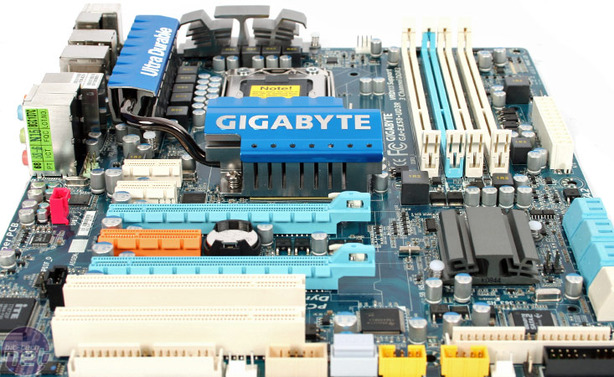Performance Conclusions
When it comes to Core i7 boards, there isn’t all that much between them, excluding the likes of the Foxconn Blood Rage and the Asus Rampage II Extreme with all their extreme overclocking features. Some might have a few more SATA ports, nicer looking PCBs and a few more cables stuffed into the box, but what most of us are interested in is the amount of GHz a motherboard is going to yield for its three-figure price.In this sense, the Gigabyte provides the best ratio of those two figures we've see so far. It’s closer to being affordable than the majority of boards out there and it’s capable of running a 2.66GHz Core i7-920 at at least 4.1GHz.
However, it's not all rosey in cheap Core i7 motherboard-land. The UD3R was pretty much the slowest board we've seen in the memory tests and file compress/decompression tests, and it struggled to keep up in the CPU-intensive HandBrake test at stock speeds too. Slow-ish memory performance and file compression tests are the compromise you make to get the huge overclocking potential for this price, however. That's a fair trade in our opinion.
Gaming on the other hand, is a different story, as there's little performance compromise here at all. Most people will want to see fast 3D performance from any motherboard, and this is something that the UD3R pretty much delivers. It wasn’t the fastest board in games, but it was consistently in the middle of the pack, beating motherboards that were much more expensive such as the Foxconn Blood Rage.
Between decent gaming performance and great overclockability, the Gigabyte GA-EX58-UD3R provides the bang for buck factor that we all look for when buying new kit, and that’s something that’s hard to find. However the layout just removes it from a recommended in our opinion. The MSI manages six memory slots and a proper PCI/PCI-Express slot layout that's not riddled with incompatibility problems.

Final Thoughts
When we looked at the comparably priced MSI X58 Pro we were surprised to find a decent feature list and good overclockability for the relatively cut-down price. Although the MSI has decent overclockability, 3.9GHz is far from the best result we’ve seen from a Core i7 motherboard so we were hoping for more from Gigabyte’s GA-EX58-UD3R.And that’s precisely what we got. The MSI and Gigabyte might be on an even keel in terms of hardware features and price, but the Gigabyte is the better overclocker hands down. The Gigabyte is also a damned sight better looking that the MSI.
Both offer power saving and features like in-BIOS BIOS flashing and profile saving, and the MSI has power and reset buttons on the PCB. However, the Gigabyte provides more tweaking and voltage options in its BIOS, even if some of them are in slightly counter-intuitive locations.
The bottom line is that we want the layout of the MSI X58 Pro, the features of the Gigabyte GA-EX58-UD3R and a mixture of the performance of both. If you can deal with the unwieldy if accurate BIOS when fine tuning big overclocks, and the fact that this motherboard doesn’t have on-board power and reset buttons, then the GA-EX58-UD3R is great value for money, and a worthy contender your cash, but not a unanimous winner against the MSI.
- Features
- x
- x
- x
- x
- x
- x
- x
- -
- -
- -
- 7/10
- Performance
- x
- x
- x
- x
- x
- x
- x
- -
- -
- -
- 7/10
- Value
- x
- x
- x
- x
- x
- x
- x
- x
- x
- -
- 9/10
- Overall
- x
- x
- x
- x
- x
- x
- x
- x
- -
- -
- 8/10

MSI MPG Velox 100R Chassis Review
October 14 2021 | 15:04









Want to comment? Please log in.